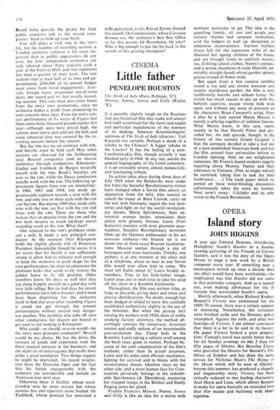CINEMA
Little father
PENELOPE HOUSTON
The Sixth of July (Paris Pullman, `U') Mumsy, Nanny, Sonny and Girly (Rialto, 'X') It is possibly slightly rough on the Russians that any historical film they make will always find itself scrutinised for the slants and angles and particular expediencies of the moment of its making. Amateur Kremlinologists' opinions of The Sixth of July (director: Yuli Karasik) are variable. Perhaps a shade of a rebuke to the Chinese? A bigger rebuke to the Czechs? It has the feeling of a post- Czechoslovakia film, though actually it was finished early in 1968. At any rate, amidst the general hagiography of the Lenin centenary, it is an unusually severe, almost melancholy, and fascinating tribute.
Its action takes place during those days of July 1918 when the Bolsheviks were under fire from the Socialist Revolutionaries (times have changed when a Soviet film admits an opposition from the left), who wanted to cancel the treaty of Brest Litovsk, carry on the war with Germany, regain the lost terri- tories and fight on for the world revolution- ary dream. Maria Spiridonova, their ex- terrorist woman leader, enunciates their policy with gloomy fervour. Lenin (Yuri Kaiurov) counters with even gloomier prac- ticalities. Socialist Revolutionary terrorists blow up the German ambassador in his art nouveau embassy—the bizarre set is no doubt one of those exact Russian reconstruc- tions. Moscow seethes through a day of harangues and street barricades. Trotsky, one gathers, is at one moment at the other end of a telephone, about as near as any Soviet film would ever allow him to come. 'We must tell Stalin about it,' Lenin. briskly re- members. True to his little-father image, Lenin pops out in mid-crisis to take his soup off the stove in a Kremlin kitchenette.
Throughout, the film uses written titles, as large as placards, giving dates and times and precise identifications. No doubt, enough has been dodged or elided to leave this carefully established authenticity slightly in the eye of the beholder. But when the picture isn't rousing the workers with 1920s shots of nobly smoking factory chimneys, the method ab- sorbingly conveys the conspiracy, ferocious tension and stuffy tedium of an interminable post-revolution day. Camp beds in the Kremlin; Lenin taking a solitary stroll among the birch trees, glum in victory. Perhaps be- cause of the cool concentration of the film's methods, rather than its actual purposes, Lenin and his aides seem efficient mechanics, fighting for survival and to blazes with the revolutionary dream. Idealism stays on the other side; and a more human face for Com- munism perversely belongs to the redoubt- able Spiridonova (A. Demidova), mustering her trapped troops in the Bolshoi and finally flinging down her pistol.
Freddie Francis's Mumsy, Nanny, Sonny and Girly is like an idea for a movie with nowhere particular to go. The idea is the appalling family, all coo and gurgle and nursery rhymes and rampant nannydom, avid for lodgers to wall up, decapitate or otherwise inconvenience. Various luckless strays, fall for the ingenuous wiles of the blazered but ageing children of the house, and are brought home to confront nursery tea, ill-fitting school clothes, Nanny's potions, and a serene chatelaine (Ursula Howells, ad- mirably straight-faced) whose garden sprouts graves instead of flower-beds.
But apart from a few camera rambles round a toy and axe strewn mansion and sunnily murderous garden, the film is only indifferently horrific and seldom funny. No victim has much reason to put up with this babyish captivity, escape routes look wide open, and without any sense of pressure on the characters Brian Comport's script, from a play by a lady named Maisie Mosco, is merely a splicing together of indolent fancies. What Maisie knew, in this case, seems mainly to be that Harold Pinter had pre- ceded her. An odd episode, though, in the history of this nursery Grand Guignol is that the company decided to take a leaf out of a now established American book and trot the film around four universities before its London opening. And, on our enlightened campuses, Mr Francis found students eagerly inquiring about Mumsy, Nanny and their relevance to Vietnam. (Not, as might naively be surmised, taking him to task for their irrelevance . . ) The trade paper which re- ported on these mind-blinding encounters unfortunately takes the story no further. Next term's essay: Udolpho and its rele- vance to the French Revolution.






































 Previous page
Previous page